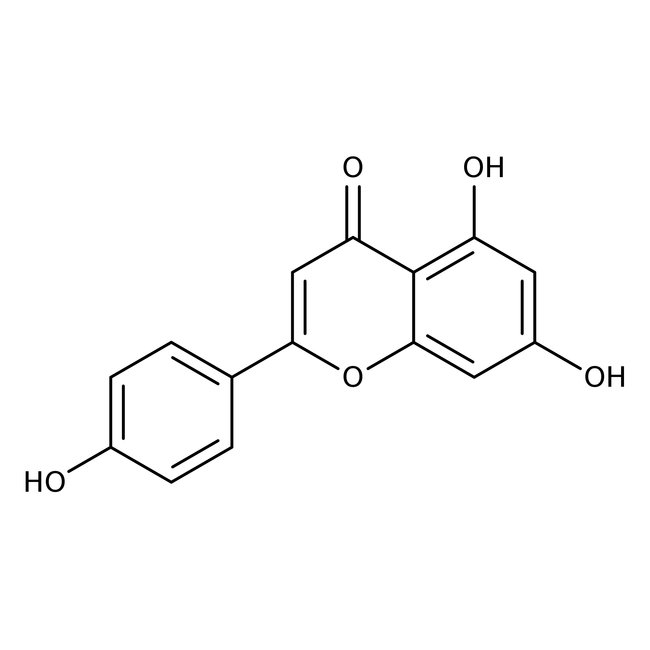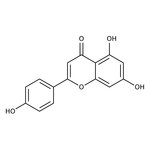Search Thermo Fisher Scientific
Thermo Scientific Chemicals
4',5,7-Trihydroxyflavone, 97%, Thermo Scientific Chemicals
CAS: 520-36-5 | C15H10O5 | 270.24 g/mol
Catalog number ALFL15041.MB
View Price:Sign InSign in to see your account pricing. Need an account? Register with us today.
Quantity:
25 mg
Chemical Identifiers
CAS7664-41-7
IUPAC Nameammonia
Molecular FormulaH3N
InChI KeyQGZKDVFQNNGYKY-UHFFFAOYSA-N
SMILESN
View more
Specifications Specification Sheet
Specification Sheet
Appearance (Form)Solution
Water=<0.5 %
Strength6.0 to 7.5 N
Appearance (Color)Clear colorless to light yellow
4',5,7-Trihydroxyflavone is a nonmutagenic flavonoid shown to inhibit cell proliferation, angiogenesis and protein kinase. Also induces apoptosis in breast cancer cells. It inhibit topoisomerase I-catalyzed DNA re-ligation and enhance gap junctional intercellular communication.
This Thermo Scientific Chemicals brand product was originally part of the Alfa Aesar product portfolio. Some documentation and label information may refer to the legacy brand. The original Alfa Aesar product / item code or SKU reference has not changed as a part of the brand transition to Thermo Scientific Chemicals.
Applications
4′,5,7-Trihydroxyflavone is a nonmutagenic flavonoid shown to inhibit cell proliferation, angiogenesis and protein kinase. Also induces apoptosis in breast cancer cells. It inhibit topoisomerase I-catalyzed DNA re-ligation and enhance gap junctional intercellular communication.
Solubility
Soluble in dimethyl sulfoxide (27 mg/ml) or 1M potassium hydroxide (50mg/ml).
Notes
Store in cool place. Keep container tightly closed in a dry and well-ventilated place. Incompatible with and strong oxidizing agents.
4′,5,7-Trihydroxyflavone is a nonmutagenic flavonoid shown to inhibit cell proliferation, angiogenesis and protein kinase. Also induces apoptosis in breast cancer cells. It inhibit topoisomerase I-catalyzed DNA re-ligation and enhance gap junctional intercellular communication.
Solubility
Soluble in dimethyl sulfoxide (27 mg/ml) or 1M potassium hydroxide (50mg/ml).
Notes
Store in cool place. Keep container tightly closed in a dry and well-ventilated place. Incompatible with and strong oxidizing agents.
RUO – Research Use Only
General References:
- Hirano T.; Oka K.; Akiba M. Antiproliferative effects of synthetic and naturally occurring flavonoids on tumor cells of the human breast carcinoma cell line, ZR-75-1. Research Communications in Chemical Pathology and Pharmacology. 1989, 64 (1), 69-78.
- Sunanda Panda.; Anand Kar. Apigenin (4‘,5,7-trihydroxyflavone) regulates hyperglycaemia, thyroid dysfunction and lipid peroxidation in alloxan-induced diabetic mice. Journal of Pharmacy and Pharmacology. 2007, 59 (11), 1543-1548.





